上海牛津版八年级下学期 B知识点梳理
上海牛津英语八年级下册知识点总结

上海牛津英语八年级下册知识点总结全文共3篇示例,供读者参考篇1Knowledge Points Summary of Oxford English 8B in ShanghaiIn the second semester of the eighth grade in Shanghai Oxford English, students will continue to build on the knowledge they have acquired in the first semester. Here is a summary of the key points covered in this semester:1. Grammar:- Review of tenses: present simple, present continuous, past simple, past continuous, present perfect, and future simple.- Conditional sentences: Zero, First, Second, and Third Conditionals.- Reported speech: Statements, questions, and requests.- Passive voice: Formation and usage.- Modals: Can, could, may, might, should, must, etc.- Relative clauses: Defining and non-defining relative clauses.2. Vocabulary:- Phrasal verbs: Break down, come across, get along with, look forward to, etc.- Idioms and expressions: A piece of cake, out of the blue, under the weather, etc.- Collocations: Make a decision, do homework, take a photo, etc.3. Reading and Comprehension:- Reading and understanding different types of texts: Narratives, informational texts, opinion pieces, etc.- Identifying main ideas, details, and implied meanings in a text.- Making inferences and drawing conclusions based on the text.4. Listening and Speaking:- Listening to different accents and understanding native speakers.- Participating in discussions, debates, and role-plays.- Describing events, experiences, feelings, and opinions in a clear and coherent manner.5. Writing:- Narrative writing: Writing stories or recounts using appropriate tenses and sequencing words.- Expository writing: Writing essays or reports with clear organization and supporting details.- Persuasive writing: Writing persuasive essays or argumentative pieces with logical reasoning and strong evidence.Overall, the eighth grade Oxford English curriculum in Shanghai aims to enhance students' language skills in listening, speaking, reading, and writing, while also deepening their understanding of grammar rules and vocabulary usage. By mastering these knowledge points, students will bewell-equipped to communicate effectively in English and further their language learning journey.篇2Shanghai Oxford English Grade 8 Focus SummaryIn the Shanghai Oxford English Grade 8 course, students are introduced to a wide range of English language skills and topics to help them further develop their proficiency in the language. Below is a summary of the key knowledge points covered in the course:1. Grammar:- Students learn about different tenses such as present simple, present continuous, past simple, past continuous, and future tenses.- They also study modal verbs, conditionals, reported speech, passive voice, and relative clauses.2. Vocabulary:- The course covers a variety of vocabulary topics including education, travel, health, technology, environment, and more.- Students practice using new vocabulary in context through reading, writing, listening, and speaking activities.3. Reading and Writing:- Students read a variety of texts including fiction,non-fiction, news articles, and poems.- They learn how to analyze and comprehend texts, identify main ideas, and infer meaning from context.- Students also practice writing different types of texts such as essays, reports, emails, and letters.4. Speaking and Listening:- Students engage in speaking activities to practice expressing ideas, opinions, and thoughts verbally.- They also practice listening to different accents and speeds of English to improve their listening skills.5. Culture and Communication:- The course includes topics on different cultures, customs, and traditions to help students understand and appreciate diversity.- Students learn about effective communication skills such as body language, intonation, and gestures.Overall, the Shanghai Oxford English Grade 8 course aims to provide students with a solid foundation in English language skills and knowledge to help them become effective communicators in both academic and real-world settings. Through engaging activities and topics, students are encouragedto continue developing their English proficiency and confidence in using the language.篇3Knowledge Points Summary of Oxford English for Shanghai Eighth GradeIn the second semester of the eighth grade, students will continue to learn English through the Oxford English textbook. The following is a summary of the key knowledge points covered in the textbook:1. Vocabulary: In the eighth grade textbook, students will learn a variety of new vocabulary words related to daily life, school subjects, hobbies, and more. It is important for students to practice using these new words in sentences to improve their vocabulary retention.2. Grammar: The eighth grade textbook covers a range of grammar topics, including verb tenses, prepositions, adverbs, and more. Students should pay close attention to these grammar rules and practice using them in sentences and conversations.3. Reading Comprehension: The textbook includes a variety of reading passages for students to practice their reading comprehension skills. Students should focus on understandingthe main ideas of the passages, identifying key details, and making inferences based on the text.4. Writing: Writing exercises in the eighth grade textbook focus on developing students' ability to write clear and coherent paragraphs. Students should practice organizing their ideas, using proper grammar and punctuation, and revising their writing for clarity and coherence.5. Speaking and Listening: Students will have opportunities to practice their speaking and listening skills through dialogues, role-plays, and discussions in the textbook. It is important for students to actively participate in these activities and practice speaking and listening in English as much as possible.Overall, the Oxford English textbook for the eighth grade provides a comprehensive overview of key English language skills, including vocabulary, grammar, reading, writing, speaking, and listening. By focusing on these key knowledge points and practicing regularly, students can improve their English proficiency and prepare for future language learning challenges.。
上海牛津版英语八年级下册8BUnit2U2总结复习
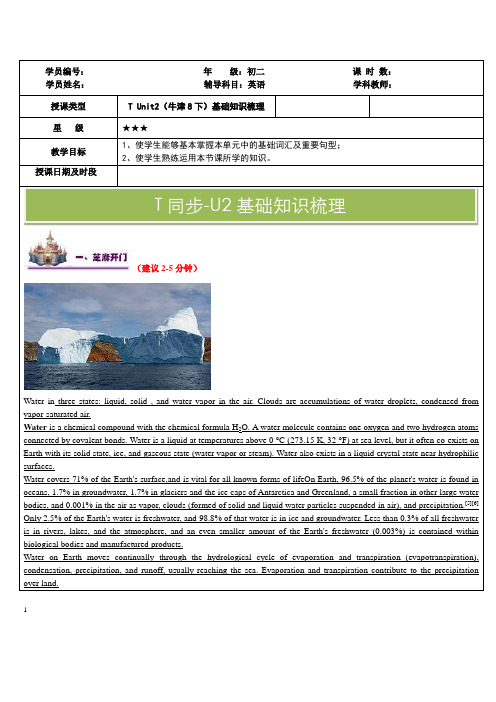
学员编号:年级:初二课时数:学员姓名:辅导科目:英语学科教师:授课类型T Unit2(牛津8下)基础知识梳理星级★★★教学目标1、使学生能够基本掌握本单元中的基础词汇及重要句型;2、使学生熟练运用本节课所学的知识。
授课日期及时段(建议2-5分钟)Water in three states: liquid, solid , and water vapor in the air. Clouds are accumulations of water droplets, condensed from vapor-saturated air.Water is a chemical compound with the chemical formula H2O. A water molecule contains one oxygen and two hydrogen atoms connected by covalent bonds. Water is a liquid at temperatures above 0 °C (273.15 K, 32 °F) at sea level, but it often co-exists on Earth with its solid state, ice, and gaseous state (water vapor or steam). Water also exists in a liquid crystal state near hydrophilic surfaces.Water covers 71% of the Earth's surface,and is vital for all known forms of lifeOn Earth, 96.5% of the planet's water is found in oceans, 1.7% in groundwater, 1.7% in glaciers and the ice caps of Antarctica and Greenland, a small fraction in other large water bodies, and 0.001% in the air as vapor, clouds (formed of solid and liquid water particles suspended in air), and precipitation.[5][6] Only 2.5% of the Earth's water is freshwater, and 98.8% of that water is in ice and groundwater. Less than 0.3% of all freshwater is in rivers, lakes, and the atmosphere, and an even smaller amount of the Earth's freshwater (0.003%) is contained within biological bodies and manufactured products.Water on Earth moves continually through the hydrological cycle of evaporation and transpiration (evapotranspiration), condensation, precipitation, and runoff, usually reaching the sea. Evaporation and transpiration contribute to the precipitation over land.T同步-U2基础知识梳理1Safe drinking water is essential to humans and other lifeforms even though it provides no calories or organic nutrients. Access to safe drinking water has improved over the last decades in almost every part of the world, but approximately one billion people still lack access to safe water and over 2.5 billion lack access to adequate sanitation. There is a clear correlation between access to safe water and GDP per capita.However, some observers have estimated that by 2025 more than half of the world population will be facing water-based vulnerability. A recent report (November 2009) suggests that by 2030, in some developing regions of the world, water demand will exceed supply by 50%.Water plays an important role in the world economy, as it functions as a solvent for a wide variety of chemical substances and facilitates industrial cooling and transportation. Approximately 70% of the fresh water used by humans goes to agriculture.批注:通过和学生一起阅读这篇文章,了解水,然后引出今天的主题。
上海牛津版英语八年级下册8BUnit1U1总结复习

学员编号:年级:初二课时数:学员姓名:辅导科目:英语学科教师:授课类型T Unit1(牛津8下)基础知识梳理星级★★★教学目标1、使学生能够基本掌握本单元中的基础词汇及重要句型;2、使学生熟练运用本节课所学的知识。
授课日期及时段T同步-U1基础知识梳理(建议2-5分钟)批注:根据图片和学生分享树的美,树是大自然中最常见的植物,反问学生,有没有想过为什么会种植这么多的树呢?树除了能够带给我们视觉上的享受,还有什么别的特殊的功能吗?思考ing-想知道你总结的完整与否?认真听完本节课,你就知晓了。
接下来我们再来看一副图片看完这幅图片,告诉我你的感受。
这种情况是由什么原因造成的呢?思考ing前面两种情况,你更喜欢哪种呢?warn sb. to do / warn sb. not to do(建议20-25分钟)一、词汇Words1. fighter斗士;战士e.g. She won't give up easily; she's a real fighter. 她不会轻易放弃的,她是一个真正的斗土。
Doctors and nurses are disease fighters. They always fight against all kinds of diseases.医生和护土是与疾病斗争的战土。
他们总是和各种疾病作斗争。
When the police came, the fighters ran away. 警察到来时,斗殴的人溜走了。
【知识拓展】fight n. 打架,战斗,斗志e. g. The two boys had a fight. 两个男孩打了一架。
fight v. (fought; fought)(常与against,with连用)打仗;战斗e. g. People often have to fight with the enemy. 人们往往不得不抗击敌人。
批注:先让学生回顾fight,然后在原有单词后面加上er,就变成了其对应的人,类似的还有work、think、play等等都是加er构成了相关的人,为后面的词缀学习法做铺垫。
牛津译林版八年级英语下册8Bunit1 past and present 课文要点全解
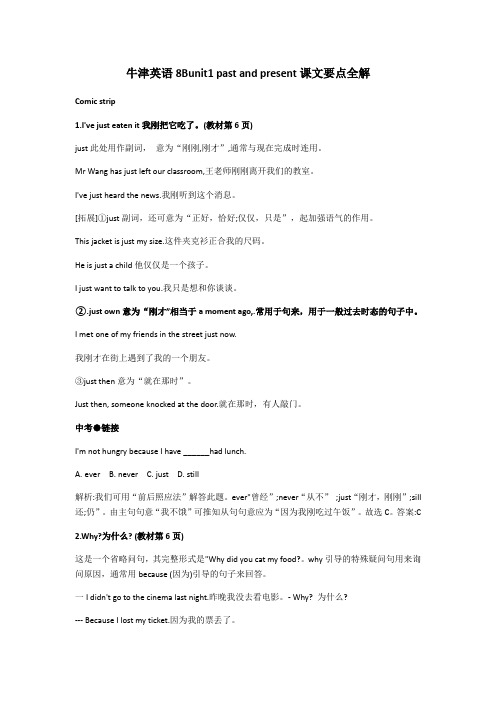
牛津英语8Bunit1 past and present课文要点全解Comic strip1.I've just eaten it我刚把它吃了。
(教材第6页)just此处用作副词,意为“刚刚,刚才”,通常与现在完成时连用。
Mr Wang has just left our classroom,王老师刚刚离开我们的教室。
I've just heard the news.我刚听到这个消息。
[拓展]①just副词,还可意为“正好,恰好;仅仅,只是”,起加强语气的作用。
This jacket is just my size.这件夹克衫正合我的尺码。
He is just a child他仅仅是一个孩子。
I just want to talk to you.我只是想和你谈谈。
②.just own意为“刚才”相当于a moment ago,.常用于句来,用于一般过去时态的句子中。
I met one of my friends in the street just now.我刚才在街上遇到了我的一个朋友。
③just then意为“就在那时”。
Just then, someone knocked at the door.就在那时,有人敲门。
中考●链接I'm not hungry because I have ______had lunch.A.everB. neverC. justD. still解析:我们可用“前后照应法”解答此题。
ever"曾经”;never“从不”;just“刚才,刚刚”;sill 还;仍”。
由主句句意“我不饿”可推知从句句意应为“因为我刚吃过午饭”。
故选C。
答案:C2.Why?为什么? (教材第6页)这是一个省略问句,其完整形式是"Why did you cat my food?。
why引导的特殊疑问句用来询问原因,通常用because (因为)引导的句子来回答。
上海牛津版八年级下学期8B知识点梳理(优选.)
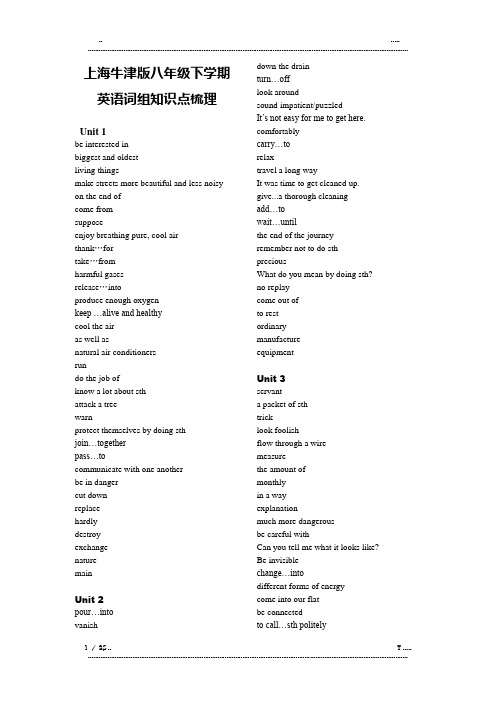
上海牛津版八年级下学期英语词组知识点梳理Unit 1be interested inbiggest and oldestliving thingsmake streets more beautiful and less noisy on the end ofcome fromsupposeenjoy breathing pure, cool airthank…fortake…fromharmful gasesrelease…intoproduce enough oxygenkeep …alive and healthycool the airas well asnatural air conditionersrundo the job ofknow a lot about sthattack a treewarnprotect themselves by doing sth join…togetherpass…tocommunicate with one anotherbe in dangercut downreplacehardlydestroyexchangenaturemainUnit 2pour…intovanish down the drainturn…offlook aroundsound impatient/puzzledIt’s not easy for me to get here. comfortablycarry…torelaxtravel a long wayIt was time to get cleaned up. give...a thorough cleaning add…towait…untilthe end of the journey remember not to do sthpreciousWhat do you mean by doing sth? no replaycome out ofto restordinarymanufactureequipmentUnit 3servanta packet of sthtricklook foolishflow through a wiremeasurethe amount ofmonthlyin a wayexplanationmuch more dangerousbe careful withCan you tell me what it looks like? Be invisiblechange…intodifferent forms of energycome into our flatbe connectedto call…sth politelycontainproduceswitch offlockencouragebehavepolitecustomerUnit 4hold a meeting/be at the meeting decide to do sththe chief editorsuggest that sb (should) do sth vote forelect sb. to betake charge ofought to do sthask for suggestionhave experiencebe secretary oftake notesthe other threebe responsible fortalk…overamongmake a list of sthpublish the paperbe free to pay for sthconsiderbrieflyask whether…have an ideathink about…a bit longermake a decision aboutagree to do sthconcludearrange to do sthin one week’s timeagree onin alltalentgather delightedshamedesigncomplainUnit 5belong toas soon aswalk into someplacebook a roomYou’re welcome.allowsound like…interruptat oncebothlead sb.Personally to…before doing sththe location of the fireexitsafetydescribe sth to sbin one own wordsbe asleepsmell smokego offmust be outsidethe phone was deadalonglay on the floorbesideseem likemoments later/seconds later be safesave one’s lifelendtake caremindlook outwatch outUnit 61. now that: since2. be behind sb3. think about doing sth.4. go abroad国外/ aboard5. why not do sth/Why don’t sb. do sth.6. spread one’s wings7. one of the most popular tourist destinations8. such as / fore example9. wide, tree-lined streets10. the same size as / as big as11. attractions / attractive12. an hour away from/ how far13. the center of Paris14. offer to do sth.15. go on to do sth./ go on doing sth.16. do it without doing sth17. enable…to / be able to do sth. /ability (n.)18. travel…from…to…19. grow crops20. make + adj./ make sb. do sth21. excellent : very good22. used to do sth. 过去常常做某事/ be used to doing习惯于做某23. be famous for24. the influence of ./ have an influence on25. in some way 26. provide sb. for sth./ provide sth. for sb.27. a leader in art and culture ( led- leading)28. a lot of young students from differentcountries go to France29. to further one’s study (why?)30. film festivals, exhibitions and concerts31. throughout the world/all over the world Unit 71. be at home/ be at work2. a boring man/ make me bored3. on the site4. walk on a narrow plank5. scared/scary6. on one’s own: by oneself7. be pleased with (pleasing, pleasure, pleasant)8. be cross/ angry9. pay attention to10. scold sb 11. put sb in detention 12. help sb in every way13. love chatting with sb (talk with)14. be puzzled by sth (puzzling)15. Pretend to do sth.16. concern about17. accept - acceptable18. express -expression19. honest- honesty-dishonest20.patient-patience-impatient-patiently-impatiently最新文件---------------- 仅供参考--------------------已改成-----------word文本--------------------- 方便更改赠人玫瑰,手留余香。
沪教牛津版八年级下册unit4专项讲解-partB
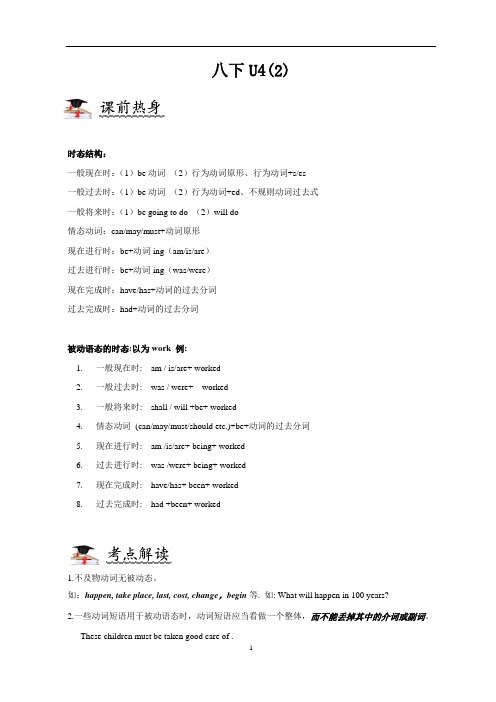
八下U4(2)时态结构:一般现在时:(1)be动词(2)行为动词原形、行为动词+s/es一般过去时:(1)be动词(2)行为动词+ed、不规则动词过去式一般将来时:(1)be going to do (2)will do情态动词:can/may/must+动词原形现在进行时:be+动词ing(am/is/are)过去进行时:be+动词ing(was/were)现在完成时:have/has+动词的过去分词过去完成时:had+动词的过去分词被动语态的时态:以为work 例:1. 一般现在时: am / is/are+ worked2. 一般过去时: was / were+ worked3. 一般将来时: shall / will +be+ worked4. 情态动词(can/may/must/should etc.)+be+动词的过去分词5. 现在进行时: am /is/are+ being+ worked6. 过去进行时: was /were+ being+ worked7. 现在完成时: have/has+ been+ worked8. 过去完成时: had +been+ worked1.不及物动词无被动态。
如:happen, take place, last, cost, change,begin等. 如: What will happen in 100 years?2.一些动词短语用于被动语态时,动词短语应当看做一个整体,而不能丢掉其中的介词或副词。
These children must be taken good care of .3.带双宾语的动词的被动态:直接宾语(物)作主语,那么动词后要用介词to 或for.在动词send, pass, give, post 等词后加to; 而在动词buy,sing, make, cook 等词后面加for.如:She gave me a book. A book was given to me by her.My mother bought me a new bike. A new bike was bought for me by my mother.二、主动形式表示被动意义1.有些动词可以用主动态形式表示被动语态。
牛津上海八下 8B Unit3 Electricity 知识点梳理
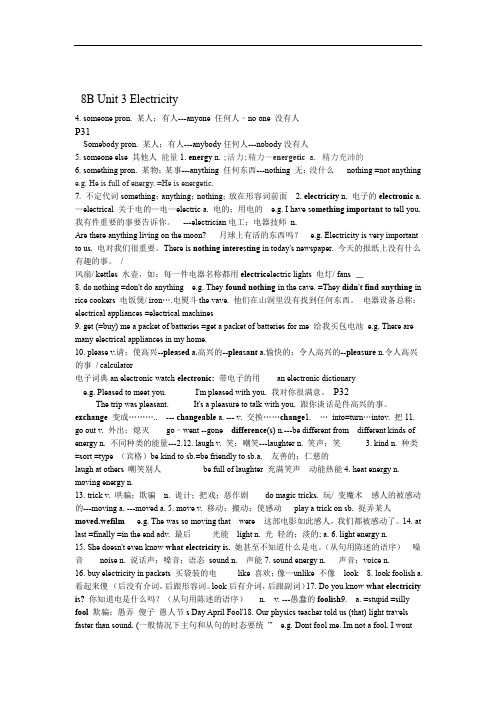
8B Unit 3 Electricity4. someone pron. 某人;有人---anyone 任何人–no one 没有人P31Somebody pron. 某人;有人---anybody任何人---nobody没有人5. someone else 其他人能量1. energy n. ;活力;精力—energetic a. 精力充沛的6. something pron. 某物;某事---anything 任何东西---nothing 无;没什么nothing =not anythinge.g. He is full of energy. =He is energetic.7. 不定代词something;anything;nothing;放在形容词前面 2. electricity n. 电子的electronic a. —electrical 关于电的—电—electric a. 电的;用电的 e.g. I have something important to tell you. 我有件重要的事要告诉你。
---electrician电工;电器技师n.Are there anything living on the moon? 月球上有活的东西吗? e.g. Electricity is very important to us. 电对我们很重要。
There is nothing interesting in today's newspaper. 今天的报纸上没有什么有趣的事。
/风扇/ kettles 水壶,如:每一件电器名称都用electric electric lights 电灯/ fans8. do nothing =don't do anything e.g. They found nothing in the cave. =They didn't find anything in rice cookers 电饭煲/ iron….电熨斗the vave. 他们在山洞里没有找到任何东西。
沪教牛津版八年级下册unit5专项讲解-partB
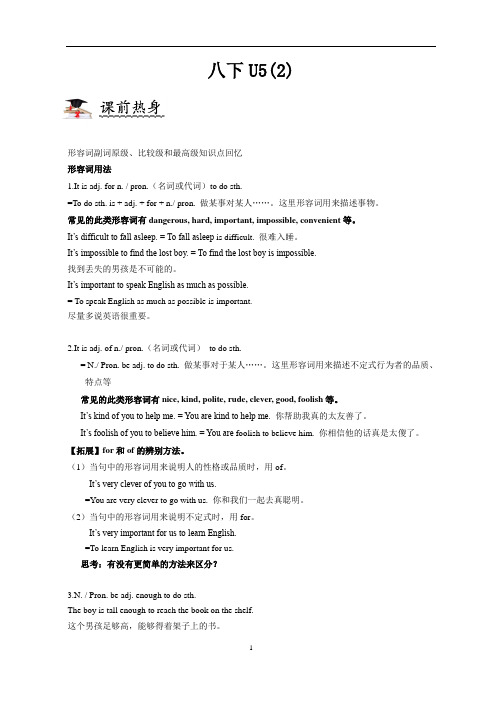
八下U5(2)形容词副词原级、比较级和最高级知识点回忆形容词用法1.It is adj. for n. / pron.(名词或代词)to do sth.=To do sth. is + adj. + for + n./ pron. 做某事对某人……。
这里形容词用来描述事物。
常见的此类形容词有dangerous, hard, important, impossible, convenient等。
It’s difficult to fall asleep. = To fall asleep is difficult. 很难入睡。
It’s impossible to find the lost boy. = To find the lost boy is impossible.找到丢失的男孩是不可能的。
It’s important to speak English as much as possible.= To speak English as much as possible is important.尽量多说英语很重要。
2.It is adj. of n./ pron.(名词或代词)to do sth.= N./ Pron. be adj. to do sth. 做某事对于某人……。
这里形容词用来描述不定式行为者的品质、特点等常见的此类形容词有nice, kind, polite, rude, clever, good, foolish等。
It’s kind of you to help me. = You are kind to help me. 你帮助我真的太友善了。
It’s foolish of you to believe him. = You are foolish to believe him. 你相信他的话真是太傻了。
【拓展】for和of的辨别方法。
(1)当句中的形容词用来说明人的性格或品质时,用of。
沪教牛津版初二下册英语知识点总结全册含习题和答案
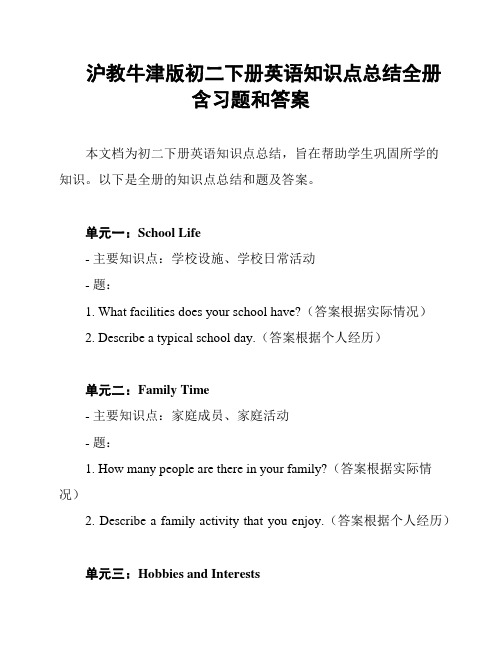
沪教牛津版初二下册英语知识点总结全册含习题和答案本文档为初二下册英语知识点总结,旨在帮助学生巩固所学的知识。
以下是全册的知识点总结和题及答案。
单元一:School Life- 主要知识点:学校设施、学校日常活动- 题:1. What facilities does your school have?(答案根据实际情况)2. Describe a typical school day.(答案根据个人经历)单元二:Family Time- 主要知识点:家庭成员、家庭活动- 题:1. How many people are there in your family?(答案根据实际情况)2. Describe a family activity that you enjoy.(答案根据个人经历)单元三:Hobbies and Interests- 主要知识点:爱好和兴趣、表达喜欢与不喜欢- 题:1. What is your favorite hobby? Why?(个人回答)2. List three things you like and three things you don't like.(个人回答)单元四:Healthy Living- 主要知识点:健康生活方式、饮食和运动- 题:1. What do you do to stay healthy?(个人回答)2. Describe a healthy meal.(个人回答)单元五:Travel and Adventure- 主要知识点:旅行和冒险、地理和文化知识- 题:1. Describe a place you would like to visit and why.(个人回答)2. What is a famous landmark in your country?(个人回答)单元六:Technology and Innovation- 主要知识点:科技和创新、数字产品和服务- 题:1. How has technology changed your life?(个人回答)2. What is your favorite digital device or service?(个人回答)- 主要知识点:语言和交流、不同国家和文化的语言- 题:1. How many languages can you speak?(个人回答)2. List three words in a language other than English.(个人回答)单元八:Entertainment and Media- 主要知识点:娱乐和媒体、影视作品和音乐- 题:1. What is your favorite movie or TV show? Why?(个人回答)2. Describe a song or piece of music you like.(个人回答)以上是沪教牛津版初二下册英语的知识点总结和题及答案。
新牛津上海版八年级英语下册单元词汇讲解(全册 共22页)

新牛津上海版八年级英语下册单元词汇讲解(全册共22页)目录Unit 1 Pollution FightersUnit 2 WaterUnit3ElectricityUnit4NewspapersUnit5Magazine ArticlesUnit6TravelUnit7Poems8B Unit 1 Trees1. pollute (v.) pollution (n.)*Pollution has become one of the most serious problems of today’s society.*The factories aren’t allowed to let out dirty water for it may pollute the river.*Trees are thought as pollution fighters.2. f ight(v. n.)争斗,斗争` fight (against) sb / sthfighter (n.) 斗士3. scientist (n.)科学家science ( n.)科学4. collect (v.)收集collection (n.) 收藏品*He used to collect stamps when he was a young boy.*The dustmen collect the rubbish once a day.*My father usually collects me after school5. She is interviewing Doctor Ray.interview (v. n) interviewer (n.) interviewee (n.)trainer---trainee. / emplover----employee6. interest*He is telling a story to the children which interests them a lot.*Tom takes great interest in stamps collection.interested (a.) *be interested in +n./doing sth7 .live (v.) 生活直播的(a.) a live football matchalive (adj.) living (adj.)lively (adj.) life (n..)*When the boy was found at last .he was still alive.*We must leart a living language not adead one.*The young are usually lively and active.8. on the earth = in the world当earth作为地球时. 前加“the” space前不加“the”9. good. 文中为n. 用处= use*I am only telling you this for your own good.*What good is it repainting if you are thinking of moving?10. make…. + adj.make us healthy / make it lighter.make…. + n.. We all made Mary our monitor.班长make….+ do sth . make me finish it in an hour.11. else 通常位于疑问词what/ where/ who等或nothing/ nobody/ no one/ something/ anything 等不定代词之后*What else did he say?*Do you want anything else, sir? -----Thanks nothing else.12.woods (n..) a piece of wood woods =forestwooden (a..) a wooden table13. in the end = finally =at last at the end of +time /place14.1) suppose (that) + a sentence*Scientists suppose that large dinosaurs lived in swamps .2)breathe (v. )呼吸be out of breath 气喘吁吁take a deep breath 做一次深呼吸15. thank (sb.)…for+n./doing sth*Thank for your help*Thank you for lending me your notebookthankful(a.)感激的be thankful to sb. for sth.16. produce(v.)production (n.) 生产过程the production of carsproduct (n.) 产品well-made products cost more 制作精美的产品比一般贵17. enough oxygen/time/money…enough + n. (+to do …)adj. +enough (+to do…)18 .keep sb/sth +adj. 保持…处于某种状态keep the door openI’m sorry to keep you waiting for so longkeep sb/sth +doing让..一直做某事19. Trees not only clean the air but also cool it.Trees cool the air and clean it as well.20. natural (a.)nature (n.)naturally (adv. )21. know / learn /eat a lot . a lot 跟v .后22. begin (v .)begin to do ….= begin doing …beginning (n .) at the beginning of …在。
(完整版)上海牛津英语8A、8B笔记

8A、8B 英语笔记整理8A Unit 1 A letter from a penfriendrelate with = about ambition 志向(a very strong wish) enclosebad—--worse--—worstill-—----worse-——worstbadly-—worse—worstowner(n。
)拥有者own(a./v.)1. What would you like to do?Would like / love to do = want to do 想要做…e.g。
Would you like / love to…Yes, I'd like to / love to, but… (理由)2. tell sb. sth。
about… 告诉某人关于……的一些事e.g. I’d like to tell you something about my trip in Hong Kong。
3. one and a half meters tall. ﹜1。
5米(or) one meter and a half﹜1.5米four and a half kilos(or) four kilos and a half用“数词+单位+形容词”来表示身高,体重,长度,宽度,年龄等e.g. This suitcase is 80cm long, 55cm wide, 5cm high.长宽高4. ﹡限定词(this, that)-数词(two)—性质(beautiful, ugly)—尺寸大小(bid)—长短(long, short)—形状(round, triangle)—新旧或年龄(old, young)-颜色(red, blue)—国籍(产地)(Chinese)—材料(wooden, leather)—状语(shining, glowing)5。
one’s hobby is doing sth.习惯性,经常one's ambition(wish / hope / duty / responsibility / job……)+ be + to do sth.除了hobby,其余全用“to do sth."e。
上海牛津版八年级下学期8B知识点梳理
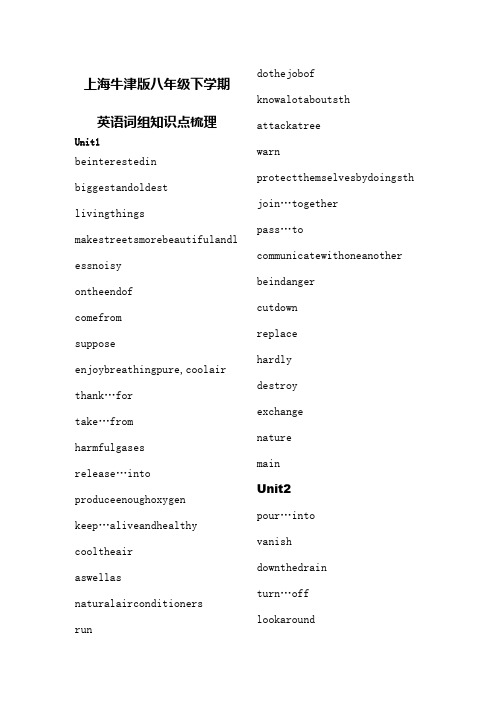
上海牛津版八年级下学期英语词组知识点梳理Unit1beinterestedin biggestandoldest livingthings makestreetsmorebeautifulandl essnoisyontheendofcomefromsuppose enjoybreathingpure,coolair thank…fortake…fromharmfulgasesrelease…into produceenoughoxygen keep…aliveandhealthy cooltheairaswellas naturalairconditionersrun dothejobof knowalotaboutsth attackatreewarn protectthemselvesbydoingsth join…togetherpass…to communicatewithoneanother beindangercutdownreplacehardlydestroyexchangenaturemainUnit2pour…intovanishdownthedrainturn…offlookaroundsoundimpatient/puzzledIt’snoteasyformetogethere. comfortablycarry…torelaxtravelalongway Itwastimetogetcleanedup. give...athoroughcleaning add…towait…until theendofthejourney remembernottodosth precious Whatdoyoumeanbydoingsth noreplaycomeoutoftorestordinarymanufactureequipmentUnit3servant apacketofsthtricklookfoolish flowthroughawiremeasuretheamountofmonthlyinawayexplanation muchmoredangerous becarefulwith Canyoutellmewhatitlookslike Beinvisiblechange…into differentformsofenergy comeintoourflat beconnected tocall…sthpolitelycontainproduceswitchofflockencouragebehavepolitecustomerUnit4holdameeting/beatthemeeting decidetodosththechiefeditor suggestthatsb(should)dosth voteforelectsb.tobetakechargeofoughttodosth askforsuggestion haveexperience besecretaryoftakenotestheotherthree beresponsiblefortalk…overamongmakealistofsth publishthepaper befreetopayforsth considerbriefly askwhether…haveanidea thinkabout…abitlonger makeadecisionabout agreetodosth conclude arrangetodosth inoneweek’stime agreeoninalltalentgatherdelightedshamedesigncomplainUnit5belongtoassoonas walkintosomeplace bookaroomYou’rewelcome.allowsoundlike…interruptatoncebothleadsb. Personallyto…beforedoingsth thelocationofthefire exitsafety describesthtosb inoneownwords beasleepsmellsmokegooffmustbeoutside thephonewasdeadalonglayonthefloorbesideseemlikemomentslater/secondslater besafesaveone’slifelendtakecaremindlookoutwatchoutUnit61.nowthat:since2.bebehindsb3.thinkaboutdoingsth.4.goabroad国外/aboard5.whynotdosth/Whydon’tsb.dosth.6.spreadone’swings7.oneofthemostpopulartourist destinations8.suchas/foreexample9.wide,tree-linedstreets10.thesamesizeas/asbigas11.attractions/attractive12.anhourawayfrom/howfar13.thecenterofParis14.offertodosth.15.goontodosth./goondoingsth .16.doitwithoutdoingsth17.enable…to/beabletodosth./ability(n. )18.travel…from…to…19.growcrops20.make+adj./makesb.dosth21.excellent:verygoodedtodosth.过去常常做某事/beusedtodoing习惯于做某23.befamousfor 24.theinfluenceof./haveaninf luenceon25.insomeway26.providesb.for sth./providesth.forsb.27.aleaderinartandculture(le d-leading)28.alotofyoungstudentsfromdifferentcountriesgotoFrance29.tofurtherone’sstudy(why)30.filmfestivals,exhibitions andconcerts31.throughouttheworld/allove rtheworldUnit71.beathome/beatwork2.aboringman/makemebored3.onthesite4.walkonanarrowplank5.scared/scary6.onone’sown:byoneself7.bepleasedwith(pleasing,ple asure,pleasant)8.becross/angry9.payattentionto10.scoldsb11.putsbindetentio n12.helpsbineveryway13.lovechattingwithsb(talkwi th)14.bepuzzledbysth(puzzling)15.Pretendtodosth.16.concernabout17.accept-acceptable18.express-expression19.honest-honesty-dishonest20.patient-patience-impatien t-patiently-impatiently。
八年级英语下册知识点归纳(牛津英语)
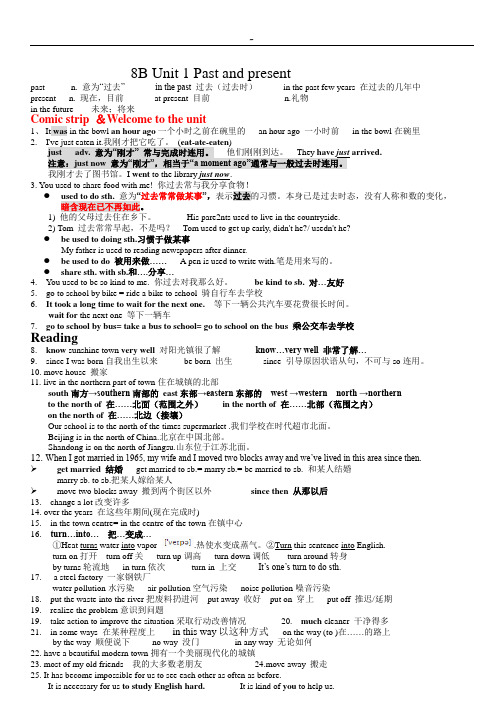
~8B Unit 1 Past and presentpast n. 意为“过去” in the past 过去(过去时)in the past few years 在过去的几年中present n. 现在,目前at present 目前n.礼物in the future 未来;将来Comic strip &Welcome to the unit1、It was in the bowl an hour ago一个小时之前在碗里的an hour ago 一小时前in the bowl在碗里2. I've just eaten it.我刚才把它吃了。
(eat-ate-eaten)just adv. 意为“刚才” 常与完成时连用。
他们刚刚到达。
They have just arrived.注意:just now 意为“刚才”,相当于“a moment ago”通常与一般过去时连用。
我刚才去了图书馆。
I went to the library just now.3. You used to share food with me! 你过去常与我分享食物!●used to do sth. 意为“过去常常做某事”,表示过去的习惯。
本身已是过去时态,没有人称和数的变化,暗含现在已不再如此。
1) 他的父母过去住在乡下。
His pare2nts used to live in the countryside.2) Tom 过去常常早起,不是吗?Tom used to get up early, didn't he?/ usedn't he?●be used to doing sth.习惯于做某事My father is used to reading newspapers after dinner.●be used to do 被用来做…… A pen is used to write with.笔是用来写的。
牛津译林版八年级下册8BUnit3知识梳理

牛津译林版八年级下册8BUnit3知识梳理知识点一 Comic-Reading 部分单词短语讲解【知识梳理】1. Have you used this before, Eddie? (P34) 艾迪,你之前使用过这个吗?What do you usually use your computer for? (P35) 你通常用电脑做什么?I usually use it to search for information. (P35) 我通常用它寻找信息。
How often do you use your computer for this? (P35) 你用电脑做这个多久一次?use用法use /ju:z/ v. 使用 adj. useless(无用的); useful(有用的)常见的词组有:① use sth. to do sth 使用某物做某事e.g.: People use knives to cut things.② use sth for sth. 为了…使用…e.g.: He uses the Pad for fun.③ used to do sth. (用于过去持续或经常发生的事)曾经e.g.: There used to be a factory here.He used to go home before 8 o’clock.④ be/ get used to sth/ doing sth. 习惯于某事/做某事e.g.: I have been in Nanjing for 8 years, and I am used to the life and climate here.She is now getting used to going home for dinner.⑤be used to do sth 被用来做……e.g.: Computers can be used to do a lot of work.2.It looks like a TV. (P34)It looks like a bird.— What does your brother look like?你哥哥什么样子?— He is tall and thin.同义句转换:What does sb look like? (外貌)=How does sb look? (外貌)=What is sb like? (品质或外貌)What does sb like?(喜好)3. agree vi. 同意, 赞成(P34)agree with sb. 同意某人的意见e.g. I don’t agree with you.agree to do sth.同意做某事agreement n.同意 reach the agreement 达成共识4. What do you usually use the computer for? (P35)该句中的What ... for? 是个固定句型, 意为“做……是为了什么?”, 其中for是介词, 表目的。
- 1、下载文档前请自行甄别文档内容的完整性,平台不提供额外的编辑、内容补充、找答案等附加服务。
- 2、"仅部分预览"的文档,不可在线预览部分如存在完整性等问题,可反馈申请退款(可完整预览的文档不适用该条件!)。
- 3、如文档侵犯您的权益,请联系客服反馈,我们会尽快为您处理(人工客服工作时间:9:00-18:30)。
上海牛津版八年级下学期
英语词组知识点梳理
Unit1
beinterestedin
biggestandoldest
livingthings makestreetsmorebeautifulandlessnoi sy
ontheendof
comefrom
suppose
enjoybreathingpure,coolair thank…for
take…from
harmfulgases
release…into produceenoughoxygen keep…aliveandhealthy cooltheair
aswellas naturalairconditioners
run
dothejobof knowalotaboutsth attackatree
warn protectthemselvesbydoingsth join…together
pass…to communicatewithoneanother beindanger
cutdown
replace
hardly
destroy
exchange
nature
main
Unit2
pour…into
vanish
downthedrain
turn…off
lookaround
soundimpatient/puzzled
It’snoteasyformetogethere. comfortably
carry…to relax
travelalongway Itwastimetogetcleanedup. give...athoroughcleaning add…to
wait…until theendofthejourney remembernottodosth precious Whatdoyoumeanbydoingsth noreplay
comeoutof
torest
ordinary
manufacture
equipment
Unit3
servant
apacketofsth
trick
lookfoolish flowthroughawire
measure
theamountof
monthly
inaway
explanation muchmoredangerous becarefulwith Canyoutellmewhatitlookslike Beinvisible
change…into differentformsofenergy comeintoourflat beconnected tocall…sthpolitely
contain
produce
switchoff
lock
encourage
behave
polite
customer
Unit4
holdameeting/beatthemeeting decidetodosth
thechiefeditor
suggestthatsb(should)dosth votefor
electsb.tobe
takechargeof
oughttodosth askforsuggestion haveexperience besecretaryof
takenotes
theotherthree beresponsiblefor
talk…over
among
makealistofsth publishthepaper befreetopayforsth consider
briefly askwhether…haveanidea thinkabout…abitlonger makeadecisionabout agreetodosth conclude arrangetodosth inoneweek’stime agreeon
inall
talent
gather
delighted
shame
design
complain
Unit5
belongto assoonas walkintosomeplace bookaroom
You’rewelcome. allow
soundlike…interrupt
atonce
both
leadsb. Personallyto…beforedoingsth thelocationofthefire
exit
safety
describesthtosb inoneownwords
beasleep
smellsmoke
gooff
mustbeoutside thephonewasdead
along
layonthefloor
beside
seemlike
momentslater/secondslater
besafe
saveone’slife
lend
takecare
mind
lookout
watchout
Unit6
1.nowthat:since
2.bebehindsb
3.thinkaboutdoingsth.
4.goabroad国外/aboard
5.whynotdosth/Whydon’tsb.dosth.
6.spreadone’swings
7.oneofthemostpopulartouristdestin ations 8.suchas/foreexample
9.wide,tree-linedstreets
10.thesamesizeas/asbigas
11.attractions/attractive
12.anhourawayfrom/howfar
13.thecenterofParis
14.offertodosth.
15.goontodosth./goondoingsth.
16.doitwithoutdoingsth
17.enable…
to/beabletodosth./ability(n.) 18.travel…from…to…19.growcrops
20.make+adj./makesb.dosth
21.excellent:verygood
edtodosth.过去常常做某事
/beusedtodoing习惯于做某
23.befamousfor
24.theinfluenceof./haveaninfluence on
25.insomeway26.providesb.forsth./p rovidesth.forsb.
27.aleaderinartandculture(led-lead ing)
28.alotofyoungstudentsfromdifferen
tcountriesgotoFrance
29.tofurtherone’sstudy(why)
30.filmfestivals,exhibitionsandcon certs
31.throughouttheworld/alloverthewo rld
Unit7
1.beathome/beatwork
2.aboringman/makemebored
3.onthesite
4.walkonanarrowplank
5.scared/scary
6.onone’sown:byoneself
7.bepleasedwith(pleasing,pleasure, pleasant)
8.becross/angry
9.payattentionto
10.scoldsb11.putsbindetention
12.helpsbineveryway
13.lovechattingwithsb(talkwith)
14.bepuzzledbysth(puzzling)
15.Pretendtodosth.
16.concernabout
17.accept-acceptable
18.express-expression
19.honest-honesty-dishonest
20.patient-patience-impatient-pati ently-impatiently。
